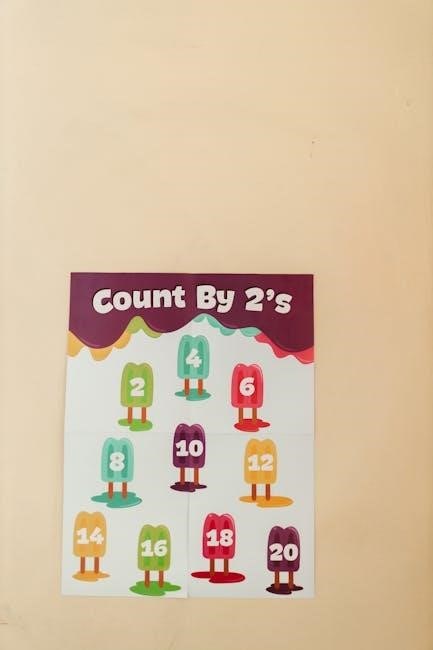Math 20-1 Alberta is a foundational course in the Pre-calculus pathway, focusing on sequences, series, trigonometry, and polynomial functions․ It emphasizes problem-solving and critical thinking, preparing students for STEM fields․ The curriculum aligns with Alberta Education’s standards, ensuring comprehensive understanding of mathematical concepts․ The official textbook and supplementary resources, including PDFs, are essential for structured learning and exam preparation․
Overview of the Course
Math 20-1 Alberta is the first course in the Pre-calculus pathway, designed to build foundational skills in algebra, trigonometry, and function analysis․ It introduces sequences, series, and polynomial functions, with a focus on problem-solving and critical thinking․ The curriculum aligns with Alberta Education’s standards, ensuring a comprehensive understanding of mathematical concepts․ The course emphasizes logical reasoning, graphing, and real-world applications, preparing students for advanced math and STEM fields․ The official textbook and supplementary resources, including PDFs, provide structured learning materials and practice exercises․ Regular assessments and evaluations are used to monitor progress and understanding throughout the course․
Importance of the Textbook in Learning
The textbook is a vital resource for Math 20-1 Alberta, providing a structured and comprehensive guide to the curriculum․ It aligns with Alberta Education’s standards, ensuring students cover all necessary topics․ The textbook includes detailed explanations, examples, and practice exercises, which are essential for mastering concepts like sequences, series, and trigonometry․ Its organized format helps students follow the course outline and prepare for assessments․ Additionally, the textbook’s availability in PDF format makes it accessible for digital learning, allowing students to study anytime and anywhere․ Regular use of the textbook supports independent study, reinforces classroom lessons, and helps students achieve their learning goals effectively․

Course Structure and Outline
Math 20-1 Alberta is structured into units covering sequences, series, trigonometry, exponents, logarithms, and polynomials․ Each unit builds on foundational concepts, progressing to complex problem-solving․ The course outline ensures a logical flow, preparing students for advanced math pathways by integrating theoretical knowledge with practical applications․
Units Covered in Math 20-1
Math 20-1 Alberta encompasses several key units designed to build foundational math skills․ The course begins with Sequences and Series, introducing concepts like arithmetic and geometric progressions․ Next, students explore Trigonometry, focusing on angles, triangles, and graphing trigonometric functions․ The unit on Exponents, Logarithms, and Inverses delves into properties of exponents, logarithmic functions, and their real-world applications․ Finally, the course covers Polynomials and Rational Functions, emphasizing polynomial operations, graphing, and simplifying rational expressions․ These units are carefully structured to ensure a progressive understanding of mathematical concepts, preparing students for advanced studies in mathematics․
Specific Learning Outcomes
Students in Math 20-1 Alberta will develop a deep understanding of mathematical concepts and their applications․ They will learn to analyze and solve problems involving sequences and series, demonstrating an understanding of arithmetic and geometric patterns․ Students will also explore trigonometric relationships, including the use of trigonometric functions to model real-world phenomena․ Additionally, they will gain proficiency in solving exponential and logarithmic equations, recognizing the importance of these functions in various contexts․ By the end of the course, students will be able to graph and analyze polynomial and rational functions, identifying key features such as zeros, asymptotes, and intervals of increase or decrease․ These outcomes ensure a strong foundation for future math studies․
Assessment and Evaluation Criteria
Assessment in Math 20-1 Alberta is designed to evaluate students’ understanding of key concepts and their ability to apply them․ Evaluations include unit exams, quizzes, assignments, and projects, with a focus on problem-solving and critical thinking․ Specific outcomes from the Alberta Education program account for 70% of the final grade, ensuring alignment with curriculum goals․ Exams and quizzes assess conceptual knowledge and procedural skills, while assignments and projects evaluate application and communication of mathematical ideas․ The evaluation criteria emphasize accuracy, logical reasoning, and the ability to interpret and present mathematical information effectively․ Regular feedback is provided to guide student progress and understanding throughout the course․

Key Topics in Math 20-1
Math 20-1 focuses on sequences, series, trigonometry, exponents, logarithms, and polynomials․ These topics build foundational skills for advanced math, emphasizing problem-solving and real-world applications․
Sequences and Series
In Math 20-1 Alberta, sequences and series are fundamental concepts․ A sequence is an ordered list of numbers, while a series is the sum of a sequence’s terms․ Students learn arithmetic and geometric sequences, recognizing patterns and calculating terms using formulas like t_n = a + (n-1)d for arithmetic sequences and t_n = ar^{n-1} for geometric sequences․ Series are explored through summation formulas, such as S_n = rac{n}{2}(a + l) for arithmetic series and S_n = a rac{r^n ⎻ 1}{r ⎻ 1} for geometric series․ These concepts are applied to real-world problems, including finance and data analysis, providing a strong foundation for advanced mathematics․
Trigonometry and Its Applications
Trigonometry in Math 20-1 Alberta introduces students to the relationships between angles and side lengths of triangles․ Core concepts include sine, cosine, and tangent functions, explored through the unit circle and right-angled triangles․ Students learn to solve trigonometric equations and apply these principles to real-world scenarios, such as physics, engineering, and navigation․ The unit circle is emphasized as a fundamental tool for understanding periodicity and inverse trigonometric functions․ Practical applications, like calculating heights or distances, illustrate the relevance of trigonometry in everyday problem-solving․ Mastery of these concepts is essential for advancing in STEM fields and prepares students for more complex mathematical studies․

Exponents, Logarithms, and Inverses

In Math 20-1 Alberta, exponents, logarithms, and their inverses are explored to understand exponential growth, decay, and logarithmic relationships․ Students learn to manipulate exponential equations, solve for variables, and apply logarithmic properties․ The unit emphasizes real-world applications, such as modeling population growth or financial interest․ Inverses of functions, particularly exponential and logarithmic, are introduced to deepen understanding of function transformations․ Graphical interpretations and practical problems enhance comprehension․ Mastery of these concepts is crucial for advanced math and science courses, as they form the basis for understanding more complex relationships and models․
Polynomials and Rational Functions
Polynomials and rational functions are central to Math 20-1 Alberta, focusing on their properties and applications․ Students learn to add, subtract, multiply, and divide polynomials, as well as factor them to solve equations․ Graphical analysis of polynomial functions, including identifying roots and end behavior, is emphasized․ Rational functions are introduced, exploring their domains, asymptotes, and simplification processes․ Problem-solving involves modeling real-world scenarios, such as optimization and rate changes․ Mastery of these concepts is essential for understanding advanced algebraic relationships and prepares students for calculus and other STEM disciplines․ Practical applications highlight the relevance of polynomials and rational functions in various fields․

Resources for Math 20-1
Key resources include the Alberta Education Mathematics Program of Studies, official textbook PDFs, recommended workbooks, and online tools like formula sheets and practice quizzes for comprehensive learning support․
Alberta Education Mathematics Program of Studies
The Alberta Education Mathematics Program of Studies outlines the curriculum framework for Math 20-1, detailing specific outcomes, assessment criteria, and learning expectations․ It provides a comprehensive guide for teachers and students, ensuring alignment with provincial standards․ The document is available as a PDF on the Alberta Education website, offering detailed insights into course structure, content, and evaluation methods․ It emphasizes the development of problem-solving skills, critical thinking, and mathematical literacy․ The program also supports integration with other subjects, fostering a holistic understanding of mathematics․ By adhering to this framework, students can effectively prepare for assessments and future academic pursuits in mathematics․
Textbook PDF Availability and Access
The Math 20-1 Alberta textbook is available in PDF format, accessible through the Alberta Education website and other educational platforms․ Students and teachers can download the PDF directly from the official sources, ensuring access to the most up-to-date curriculum materials․ The PDF version of the textbook includes detailed explanations, examples, and practice problems, aligning with the Alberta Education Mathematics Program of Studies․ Supplementary resources, such as workbooks and study guides, are also available in PDF format, providing additional support for learning and exam preparation․ These digital resources are designed to enhance understanding and convenience for students pursuing the Math 20-1 course․
Recommended Workbooks and Study Guides
Several workbooks and study guides are recommended to complement the Math 20-1 Alberta curriculum․ These resources, such as the “Math 20-1 Alberta Workbook,” are specifically designed to align with the course outcomes and textbook content․ They provide additional practice problems, step-by-step solutions, and review exercises to reinforce learning․ Many of these workbooks are available in both print and digital formats, offering flexibility for students․ Some popular study guides include comprehensive summaries of key concepts, formula sheets, and tips for exam preparation․ These supplementary materials are invaluable for students seeking extra support or those aiming to excel in the course․ They cater to diverse learning styles and preferences, ensuring a well-rounded study experience․
Online Resources and Tools
Various online resources and tools are available to support learning in Math 20-1 Alberta․ Platforms like YouMath and math․edu․pl offer interactive lessons, practice quizzes, and solved examples․ These tools provide students with the opportunity to test their knowledge and improve problem-solving skills․ Additionally, websites such as Alberta Education’s official portal offer downloadable resources, including formula sheets and study guides․ Online forums and communities, such as those dedicated to math discussions, allow students to ask questions and share solutions․ These digital tools enhance learning by offering flexible and accessible ways to review course material, practice problems, and prepare for exams․ They are particularly useful for visual learners and those who benefit from interactive study methods․

Study Tips and Strategies
- Utilize online resources like YouMath and math․edu․pl for interactive lessons and quizzes․
- Dedicate time daily to practice problems and review textbook chapters․
- Join study groups or online forums for collaborative learning and problem-solving․
Effective Note-Taking Techniques

Effective note-taking is crucial for success in Math 20-1 Alberta․ Organize your notes by textbook chapters and key topics, ensuring clarity and easy review․ Use bullet points and headings to structure concepts, making complex ideas digestible․ Highlight important formulas and theorems, and summarize lessons at the end of each class․ Practice active recall by rewriting notes in your own words, reinforcing understanding․ Review and update your notes regularly, cross-referencing with textbook content and online resources like YouMath or math․edu․pl for additional practice․ This systematic approach will help you master sequences, series, and polynomial functions, ensuring readiness for exams and quizzes․
Practicing Past Exams and Quizzes
Practicing past exams and quizzes is a proven strategy to excel in Math 20-1 Alberta․ Utilize resources like YouMath and math․edu․pl for access to practice questions and quizzes․ Reviewing past exams helps familiarize yourself with the exam format, timing, and question types․ Focus on understanding common problem patterns, such as sequences, series, and polynomial functions․ After attempting a quiz, thoroughly review your mistakes and compare your solutions with the textbook or online resources․ Regular practice builds problem-solving speed and accuracy, ensuring you are well-prepared for assessments․ Consistent review of past exams and quizzes is key to achieving success in this course․
Using Technology for Problem Solving
Technology plays a vital role in enhancing problem-solving skills for Math 20-1 Alberta․ Online platforms like YouMath and math․edu․pl offer interactive tools and practice quizzes to reinforce concepts․ Graphing calculators and software, such as Desmos, allow students to visualize and explore mathematical relationships, making complex ideas more accessible․ Additionally, digital versions of textbooks provide convenient access to examples and exercises․ Utilizing these resources enables students to work through problems at their own pace, receive real-time feedback, and identify areas for improvement․ By integrating technology into their study routine, students can deepen their understanding and develop efficient strategies for tackling challenging problems in Math 20-1․

Assessments and Exams
Assessments and exams in Math 20-1 Alberta evaluate understanding of specific outcomes, with 70% of the grade based on these evaluations․ A formula sheet PDF is provided for reference․
Understanding the Exam Format
The Math 20-1 Alberta exam assesses knowledge of sequences, series, trigonometry, and polynomials․ It includes multiple-choice and open-response questions, with a focus on problem-solving and application․ Students are provided with a formula sheet to reference during the exam․ The exam is divided into sections, each weighted according to the course outcomes․ Time management is crucial, as students must allocate their time effectively across all questions․ Understanding the format helps reduce anxiety and improves performance․ Practicing past exams and reviewing the textbook PDF can familiarize students with the structure and content, ensuring they are well-prepared for the assessment․
Key Formulae and Concepts to Remember
Mastering key formulae and concepts is essential for success in Math 20-1 Alberta․ Important topics include arithmetic and geometric sequences, trigonometric identities, exponential and logarithmic functions, and polynomial operations․ The textbook PDF provides detailed explanations and examples of these concepts․ Key formulae, such as the nth term of a sequence, the law of sines and cosines, and properties of exponents, are crucial for problem-solving․ Understanding logarithmic inverses and polynomial division is also vital․ Regular review of these concepts and practicing their application ensures a strong foundation for exams and future math courses․ Referencing the textbook and formula sheets will help reinforce these key ideas․
Time Management During Exams
Effective time management is critical during Math 20-1 Alberta exams․ Allocate time evenly across all questions, prioritizing those with higher weightage․ Start with questions you find easier to build confidence and momentum․ Skip challenging problems initially, marking them for later review․ Use the provided formula sheet wisely to avoid wasting time recalling complex equations․ Practice under timed conditions using past papers to improve speed and accuracy․ Review your answers briefly before submitting, ensuring all questions are attempted․ Proper time management reduces stress and maximizes your score․ The textbook PDF and study guides offer valuable practice exams to refine these skills․

Additional Support and Resources
Students can access the Alberta Education Mathematics Program of Studies, textbook PDFs, and recommended workbooks․ Online resources, tutoring, and study groups provide further academic support and guidance․
Tutoring and Study Groups
Tutoring and study groups are excellent resources for Math 20-1 students․ Many schools offer peer tutoring programs, where students can receive one-on-one support․ Study groups provide collaborative learning environments, allowing students to discuss challenging topics and share problem-solving strategies․ Online forums and communities also offer additional support, connecting students with peers and tutors worldwide․ These resources help students clarify doubts, improve understanding, and stay motivated․ Regular participation in tutoring and study groups can significantly enhance academic performance and confidence in math․ They are particularly beneficial for mastering complex concepts like sequences, series, and trigonometry․ Utilizing these resources ensures students have the support needed to succeed in their studies․
Online Forums and Communities
Online forums and communities are invaluable for Math 20-1 students seeking additional support․ Platforms like math․edu․pl and YouMath offer interactive lessons, exercises, and problem sets tailored to various math topics․ These resources allow students to engage with peers and educators globally, fostering collaborative learning․ Many forums provide access to practice problems, study guides, and detailed solutions, helping students refine their skills․ Additionally, online communities enable students to ask questions, share resources, and gain insights from others facing similar challenges․ Leveraging these digital spaces can enhance understanding and confidence in math, particularly for complex topics like sequences and series․ They serve as a supplement to traditional learning, offering flexibility and convenience for students․
Teacher and Peer Support
Teacher and peer support play a crucial role in mastering Math 20-1 Alberta․ Educators provide personalized guidance, clarifying complex concepts like sequences and series, and offer one-on-one help during office hours․ They also facilitate study groups, fostering a collaborative learning environment․ Peers can collaborate on problem sets, share study strategies, and discuss challenging topics, reinforcing mutual understanding․ Online forums and school-sponsored platforms further enable students to connect with classmates and teachers, ensuring access to help beyond the classroom․ This collective support system empowers students to overcome difficulties, build confidence, and achieve academic success in the course․

